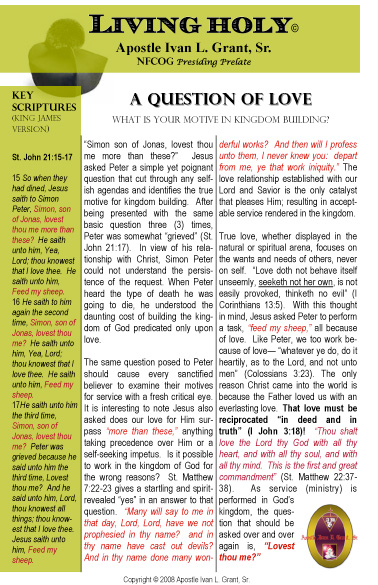So when they had dined, Jesus saith to Simon Peter, Simon, son of Jonas, lovest thou me more than these? He saith unto him, Yea, Lord; thou knowest that I love thee. He saith unto him, Feed my sheep.
He saith to him again the second time, Simon, son of Jonas, lovest thou me? He saith unto him, Yea, Lord; thou knowest that I love thee. He saith unto him, Feed my sheep.
He saith unto him the third time, Simon, son of Jonas, lovest thou me? Peter was grieved because he said unto him the third time, Lovest thou me? And he said unto him, Lord, thou knowest all things; thou know est that I love thee. Jesus saith unto him, Feed my sheep.
John 21:15-17
“Simon son of Jonas, lovest thou me more than these?” Jesus asked Peter a simple yet poignant question that cut through any selfish agendas and identifies the true motive for kingdom building. After being presented with the same basic question three (3) times, Peter was somewhat “grieved” (John 21:17). In view of his relationship with Christ, Simon Peter could not understand the persistence of the request. When Peter heard the type of death he was going to die, he understood the daunting cost of building the kingdom of God predicated only upon love.
The same question posed to Peter should cause every sanctified believer to examine their motives for service with a fresh critical eye. It is interesting to note Jesus also asked does our love for Him surpass “more than these,” anything taking precedence over Him or a self-seeking impetus. Is it possible to work in the kingdom of God for the wrong reasons? Matthew 7:22-23 gives a startling and spirit revealed “yes” in an answer to that question. “Many will say to me in that day, Lord, Lord, have we not prophesied in thy name? And in thy name have cast out devils? And in thy name done many wonderful works? And then will I profess unto them, I never knew you: depart from me, ye that work iniquity.” The love relationship established with our Lord and Savior is the only catalyst that pleases Him; resulting in accept able service rendered in the kingdom.
True love, whether displayed in the natural or spiritual arena, focuses on the wants and needs of others, never on self. “Love doth not behave itself unseemly, seeketh not her own, is not easily provoked, thinketh no evil” (1 Corinthians 13:5). With this thought in mind, Jesus asked Peter to perform a task, “feed my sheep,” all because of love. Like Peter, we too work be cause of love — “whatever ye do, do it heartily, as to the Lord, and not unto men” (Colossians 3:23). The only reason Christ came into the world is because the Father loved us with an everlasting love. That love must be reciprocated “in deed and in truth” (I John 3:18)! “Thou shalt love the Lord thy God with all thy heart, and with all thy soul, and with all thy mind. This is the first and great commandment” (Matthew 22:37 38). As service (ministry) is performed in God’s kingdom, the question that should be asked over and over again is, “Lovest thou me?”

Our monthly email newsletter keeps you up to date with the Nation of NFCOG.